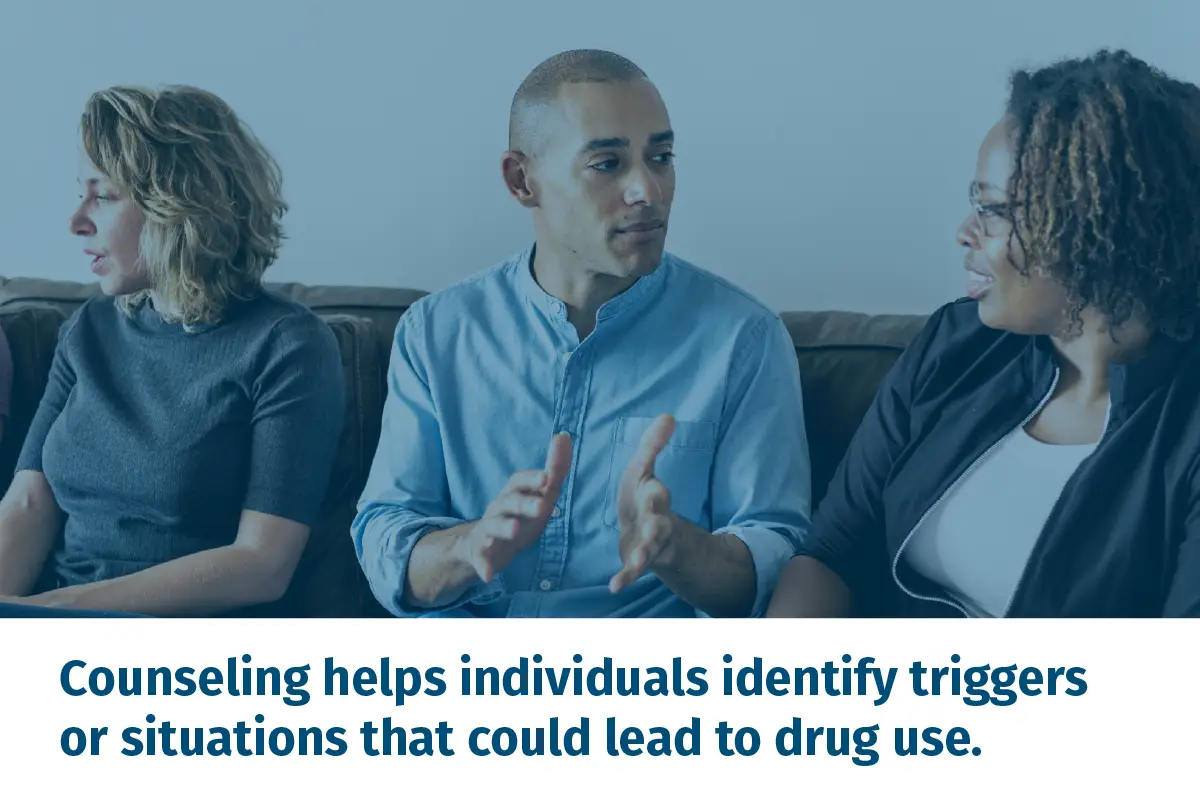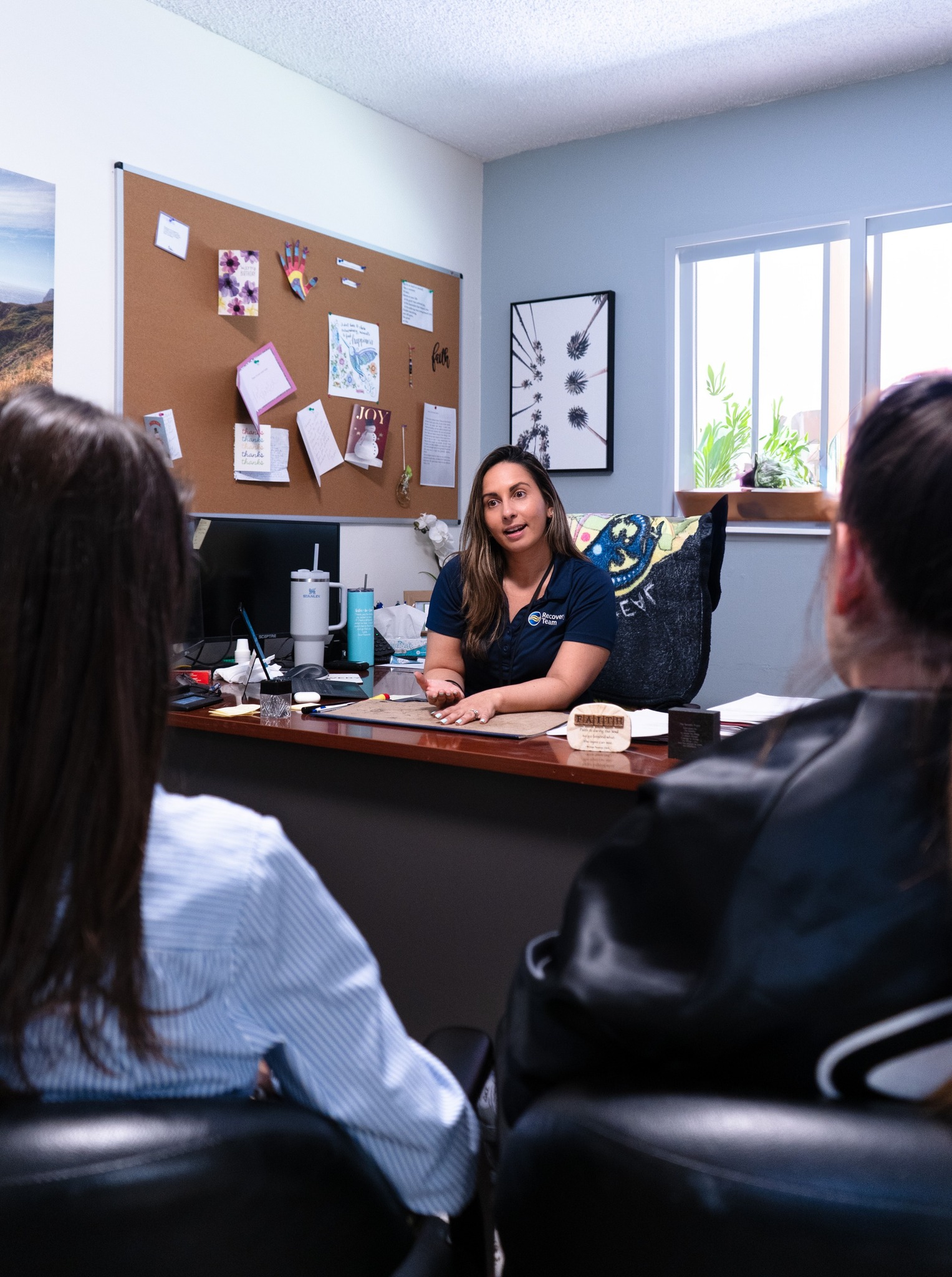The Role Of Counseling In Preventing Drug Addiction
More Resources
You’re Not Alone – We're Here to Help
Call us today to get the support and guidance you deserve.
How Counseling Helps Prevent Drug Addiction: Key Strategies and Benefits
Drug addiction continues to be a significant public health concern in the United States, impacting individuals of all ages. While various approaches exist to address addiction issues, counseling emerges as an essential component in prevention efforts.
Counseling interventions aim not only to treat existing addiction but also to prevent its onset by addressing underlying factors and promoting healthier habits. In this article, we will dig deeper into the role of counseling in preventing drug addiction.
Key Takeaways
Drug addiction is a complex issue, but prevention efforts through counseling can help address its multifaceted nature. This article covers:
- Counseling provides individuals with support, education, and coping strategies to prevent drug addiction and promote positive change.
- Various counseling approaches, such as behavioral therapies, offer tailored strategies to address different aspects of addiction.
- Integrating approaches like medication-assisted treatment (MAT) can enhance the efficacy of counseling in addiction prevention.
Understanding Drug Addiction
Drug addiction, or substance use disorder (SUD), is a chronic disease characterized by the compulsive use of substances despite harmful consequences. There are various types of drug addiction, including addiction to alcohol, nicotine, opioids, stimulants, and depressants. Each type of addiction impacts the brain and behavior differently.
Several factors contribute to drug addiction. Genetics plays a significant role, as a family history of addiction increases the risk. Environmental factors such as peer pressure, stressful events, and trauma also contribute. Moreover, mental health disorders like depression and anxiety can lead individuals to use substances as a coping mechanism.
The impacts of drug addiction on individuals are severe and far-reaching. It can contribute to physical health problems like heart disease, liver damage, and overdose. Mental health is also affected, with an increased risk of anxiety, depression, and suicidal thoughts. Socially, it can damage relationships, result in job loss, and cause financial instability.
Recognizing the signs of drug abuse and addiction and seeking professional help, such as counseling and therapy, early can improve outcomes and support recovery efforts.
Treatment Here is Covered by Insurance
Most insurance plans cover treatment here, so the cost to you as low as possible - sometimes even zero. Click below to verify your coverage.






Counseling And Its Role In Drug Addiction Prevention
In counseling, trained professionals work with individuals to address personal challenges, overcome obstacles, and improve their well-being. In the context of drug addiction prevention, counseling aims to empower individuals with the knowledge and skills to resist the temptation of drugs and make positive lifestyle changes.
Here is how counseling plays a crucial role in prevention of drug addiction:
One of the primary goals of counseling in drug addiction prevention is to educate individuals about the risks associated with substance abuse and raise awareness about the impact it can have on their lives. By providing accurate information and resources, drug counselors empower people to make informed decisions and resist peer pressure to experiment with drugs.
Counseling helps individuals identify triggers or situations that may lead to drug use. By recognizing these triggers, individuals can develop effective coping mechanisms to manage cravings and resist the urge to use drugs. Substance abuse counselors work with clients to develop tailored strategies for dealing with stress, peer pressure, and other triggers without resorting to substance abuse.
Building resilience is an essential aspect of drug addiction prevention. Through counseling, individuals develop resilience by building self-esteem, enhancing problem-solving skills, and fostering a positive mindset. Resilient individuals are better equipped to withstand life’s challenges and are less likely to turn to drugs as a coping mechanism.
Many individuals turn to drugs as a way to cope with underlying issues such as trauma, depression, or anxiety. Counseling provides a platform for individuals to address these underlying issues in a supportive environment. By exploring the root causes of their substance use, people can develop healthier coping strategies and work towards long-term recovery.
Counselors offer unwavering support and motivation to individuals on their journey toward addiction prevention. Through empathy, encouragement, and guidance, counselors help individuals stay focused on their goals and overcome obstacles. Knowing that they have a supportive ally can significantly increase an individual’s motivation to stay drug-free.
Relapse is a common challenge faced by many recovering from drug addiction. Counseling equips individuals with the skills and strategies needed to prevent relapse. By identifying warning signs, developing coping strategies, and creating a relapse prevention plan, individuals can effectively navigate triggers and temptations without turning to drugs.

Counseling Approaches In Drug Addiction Prevention
Counseling offers various approaches to address drug addiction and prevent its onset. Each approach is tailored to fit the individual needs of clients and may involve different techniques and strategies:
Cognitive Behavioral Therapy (CBT) – Helps individuals identify and change negative thoughts and behaviors related to drug use. It teaches coping skills to manage cravings and stress.
Dialectical Behavior Therapy (DBT) – Focuses on emotional regulation, mindfulness, and stress management to prevent drug use as a coping mechanism.
Motivational Interviewing (MI) – Encourages individuals to explore their feelings about drug use and make positive changes through supportive conversations.
Contingency Management (CM) – Uses rewards and incentives to encourage drug-free behaviors, such as attending therapy or passing drug tests.
Eye Movement Desensitization and Reprocessing (EMDR) – Helps process trauma and emotional distress that may lead to addiction, promoting healthier coping mechanisms.
Family Therapy – Involves family members in the recovery process, improving communication and support to create a healthier environment.
Ways To Enhance The Effectiveness Of Counseling
To further strengthen the effectiveness of counseling in addiction prevention, various complementary approaches can be integrated into treatment plans:
Medication-Assisted Treatment (MAT) – Uses FDA-approved medications like methadone or buprenorphine alongside counseling to reduce cravings, manage withdrawal, and prevent relapse.
Support Groups – Programs like Narcotics Anonymous (NA) and Alcoholics Anonymous (AA) provide peer support, accountability, and encouragement for long-term recovery.
Holistic Therapies – Practices like yoga, meditation, acupuncture, and art therapy help reduce stress, promote relaxation, and support overall well-being in addiction recovery.
Dual Diagnosis Treatment – Integrates mental health and addiction counseling for individuals struggling with both substance use and mental health disorders.
Healthy Lifestyle Changes – Encourages regular exercise, balanced nutrition, quality sleep, and stress management to support physical and mental health during recovery.
Peer Recovery Support Services – Connects individuals with mentors who have personal experience in addiction recovery, providing guidance, encouragement, and real-life support.
Reclaim Your Life With The Recovery Team
If you’re grappling with substance use, know this: you’re not alone, and there’s hope. At The Recovery Team, we’re here to guide you back to a drug-free life.
We offer a comprehensive range of care personalized to your needs. With evidence-based therapies and holistic approaches, we equip you with the tools to conquer addiction effectively. In addition, if you’re grappling with addiction alongside mental health challenges, our dual diagnosis support offers treatment for both conditions simultaneously.
Don’t wait another day to reclaim your life. Call us now at (800) 817-1247. Every step forward is a victory; we’re here to support you.
Answers to Common Questions
Navigating the journey to recovery can bring up many questions. Below are some of the most commonly asked questions about our services. If you need more information or have additional questions, we are only a phone call away.

Counseling is essential in recovery because it provides support and guidance during challenging times. It offers a safe space to talk about struggles and feelings without judgment. Counselors help people understand the root causes of their addiction and develop healthy coping strategies.
By exploring past experiences and emotions, counseling helps build self-awareness and resilience. It provides practical tools for managing cravings and avoiding relapse. Additionally, counseling fosters a sense of connection and accountability, reducing feelings of isolation.
Counseling can offer helpful strategies for dealing with peer pressure related to drug use. Counselors can teach individuals to assertively avoid peer pressure without feeling embarrassed or left out. They may also help clients identify supportive friends who respect their decision to stay drug-free.
Through role-playing and practicing assertiveness, individuals can gain confidence in resisting peer pressure. Additionally, addiction counselors may explore underlying reasons for seeking acceptance through drug use and offer alternative ways to feel valued and connected.
Available 24/7
The Next Step Is A Simple Phone Call
Give us a 5-minute call for more information about our services. There is no commitment or judgement – we’ve been there before ourselves.
Contact us for more information :
Call Us
(800) 817-1247
Verify Insurance
100% Confidential
